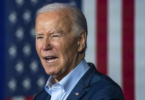BEIRUT (Reuters): The term of Lebanon’s powerful General Security chief Abbas Ibrahim is set to end this week as neither cabinet nor parliament have discussed a measure that would allow him to stay on after reaching the legal retirement age.
Ibrahim, who hails from southern Lebanon, has headed the General Security directorate since 2011 and is considered a key regional interlocutor who has good ties with the Iran-backed group Hezbollah and links with Western governments.
On Thursday, he will turn 64, which is the legal retirement age in Lebanon. Lebanese authorities have in the past issued exceptional exemptions for top officials to stay on past 64 if a vacuum in their post is seen as risking instability.
But Lebanon’s caretaker cabinet did not discuss an extension at its meeting on Monday. Information Minister Ziad Makary told reporters after the meeting that cabinet “can do nothing” and that the decision was to be taken by the interior minister.
Caretaker Interior Minister Bassam Al-Mawlawi, whose ministry manages General Security and some other security forces, did not respond to a Reuters request for comment.
Lebanon’s caretaker premier Najib Mikati said in an interview last week that the issue should be dealt with by parliament as it involved legal amendments. Parliament has not met and no session is scheduled before Ibrahim is set to retire.
A source close to Hezbollah told Reuters that the group had tried to “throw its full weight” behind a parliament session to extend Ibrahim’s term but was unable to secure enough support.
Mawlawi is expected to name an acting chief once Ibrahim’s term ends. Lebanon is already in an unprecedented constitutional crisis — with the presidency vacant and cabinet acting in a caretaker capacity since last year’s parliamentary elections.
Ibrahim is seen as close to Hezbollah and authorities in neighboring Syria, but he has also regularly traveled to Washington and Paris to meet top officials there.
As a result, he has been seen as an important interlocutor, involved in cases from the missing US reporter Austin Tice to US-mediated talks between Lebanon and Israel on their maritime border, which was delineated last year.
He was charged earlier this year by Tarek Bitar, the Lebanese judge investigating the catastrophic August 2020 Beirut port explosion, but remained in his post. Ibrahim declined to comment on the charges at the time.







